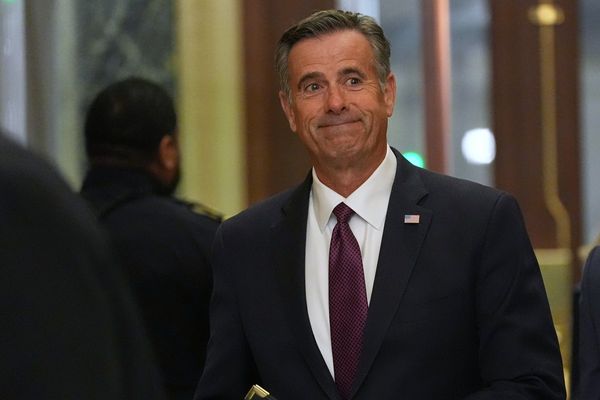Feeling more anxious? More unsure? Unless you're heavily sedated, you should be: We've never witnessed so many population-wide shifts simultaneously in our lifetime.
- Three titanic tectonic plates are shifting at once: our technology, our governing and our reality-shaping. Washington, D.C., is the epicenter of all three.
Why it matters: You can't navigate business, politics, social media or life generally without understanding the speed, consequence and interconnectedness of these shifts.
- Think of this as a wide-angle lens on the world unfolding before you in real time.
Let's break down the three shifts, starting with the most apparent:
1. A once-in-a-century shift in politics and governance. President Trump reinvented, in substantial and lasting ways, the Republican Party ... then American politics ... then American governance. We just wrote about 15 ways Trump is stretching the imperial presidency to unprecedented lengths. That's but a small sampling of how he reordered politics, top to bottom.
- Trump and the reaction to him are reshaping what the parties believe or stand for, and who votes for them ... the language and platforms politicians use ... the relevance and popularity of institutions and outside experts ... and the way other nations view us. The politics and norms of one short decade ago are unrecognizable today.
2. A once-in-a-generation shift in how our realities are formed. Stop thinking about news as a way to understand the world. Instead, lock in on the ways splintering information inputs — the shards of glass — shape our individual realities. The very act of writing about individual-based realities would have seemed nonsensical a decade ago. Today, it's not even debatable.
- As a society, we're breaking into hundreds or thousands of information bubbles, shaped and hardened based on our age, politics, jobs and interests. Pick six random people — and it's possible all get most of their information on platforms the others never visit, and trust people the others have never heard of. This is a wild new world. This change is only accelerating with the fast decline of TV and cable, traditional print and digital media, and local news. In its place: an even faster rise of podcasters, YouTubers, Substackers, and digital communities.
- This speed of change is particularly benefiting Trump-aligned media: In just a few-month period, CBS was bought by a more Trump-friendly owner — who pursued Bari Weiss and her iconoclastic digital media operation, The Free Press, to help run it. Trump last week signed an order turning significant control of TikTok, the most popular platform for young people, over to Oracle, founded by Larry Ellison — father of David Ellison, the new CBS owner. Local-TV heavyweights Sinclair and Nexstar briefly continued preempting Jimmy Kimmel, even after ABC put him back on-air. Nexstar is seeking federal approval to merge with Tegna.
- Defunding NPR and PBS has gutted local media even further — while national media, much of it based in D.C., gets more attention. Trump has pushed aggressively to bring independent agencies that regulate media and tech closer to the Executive Branch, and thus his agenda.
- Your takeaway: The reality-shaping machines are changing faster than most people can keep up with.
3. A once-in-a-generation (and maybe lifetime) technology shift. AI has the promise (and high likelihood) of upending society at a scale greater than the internet, and possibly as profoundly as fire or electricity. We've explained in great detail our obsession with AI, and our reporting on the good, bad and very ugly that might unfold.
- With the tech world so enmeshed in the Trump administration and dependent on government funding, regulation and adoption, Silicon Valley is starting to influence D.C. like Wall Street once did, as Axios' Dan Primack put it. It's the Great Fusing: Washington and Silicon merging because of codependence, necessity and urgency.
- Make no mistake: AI is getting better, faster, and more human-like in its thinking than most realize. Anthropic CEO Dario Amodei told us it could destroy half of all white collar jobs in a few short years and has a 25% chance of essentially destroying humanity.
- Sit with that sentence for a minute. We're unleashing a technology with potentially God-like powers many years from now. And we've yet to find a single CEO who has told us privately they're not curtailing hiring based on the promise of AI to do the work humans do.
- Julian Schrittwieser, an AI researcher at Anthropic, wrote in an eye-opening post this weekend that by the end of 2027, "models will frequently outperform experts on many tasks." By the middle of next year, he wrote, "models will be able to autonomously work for full days (8 working hours)," completing tasks that would take a human roughly a day to accomplish. Schrittwieser elaborated for us from London that the work won't be identical: "This is just an estimate of the scope of tasks they will be able to do. ... I would expect a human would supervise and orchestrate many models, in the same way that currently a senior worker might supervise and coordinate multiple less experienced workers."
The bottom line: You might find this wide-angle lens horrifying or illuminating. But you'd be hard-pressed to debunk any of it based on what's unfolding before our eyes.
- Never before has the nation needed more people spending more time thinking more originally about how to adjust government, business and personal thinking to meet a wild moment.
💡 Let us know what you think: jim@axios.com & mike@axios.com.
- Go deeper: America's tectonic shifts.







